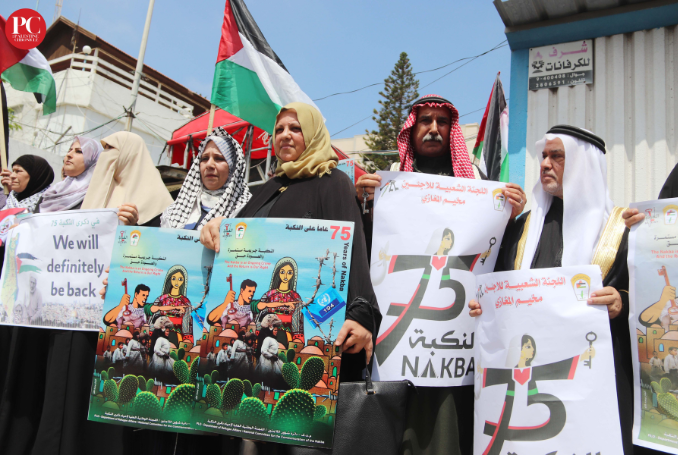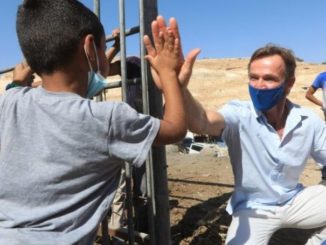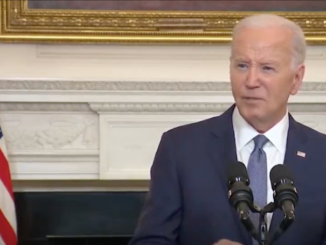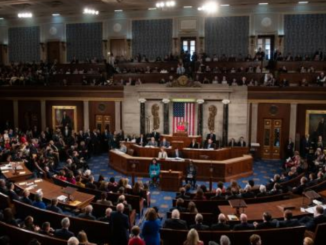
By Benay Blend
Presidential hopeful Ron DeSantis has gained national attention for directing new African American history standards adopted in 2023 by the Florida Board of Education.
Henry Giroux, who currently holds the McMaster University Chair for Scholarship in the Public Interest in the English and Cultural Studies Department and is the Paulo Freire Distinguished Scholar in Critical Pedagogy, has written extensively on the Nazification of American education, a topic that is important because it has much in common with Zionist hasbara (propaganda).
His most recent focus has been Florida Governor and presidential hopeful Ron DeSantis, who has gained national attention for directing new African American history standards adopted in 2023 by the Florida Board of Education. Under the new curriculum, middle-school students are taught that slaves profited from slavery “by developing new skills which…could be applied to their personal benefit.”
“It is hard to understand how African Americans,” writes Giroux, “who were raped, tortured, whipped, and subject to unimaginable acts of dehumanization and violence somehow benefited from the horrors of slavery.” He concludes that “this is white supremacy on steroids.”
Similarly, during the 2014 Israeli shelling of Gaza, the Israeli Embassy to the UN in Geneva claimed that “despite the constant rocket fire into Israel, the Kerem Shalom crossing remained open during Operation Protective Edge, providing food and essential supplies for the residents of the Gaza Strip.”
It is hard to reconcile the Zionist state’s alleged humanitarian efforts with lives lost during the 2014 shelling—2145 Gazans, the vast majority of them civilians, and a “staggering” 578 among them children. None of this was mentioned in the Zionist report. Instead, they preferred to mention only “Hamas rockets” fired into Israel.
Very much like the Zionist project against the Palestinians, white colonizers sought to strip the Navajo of their land, their humanity, and their identity as Indigenous people. In Reclaiming Diné History: The Legacies of Navajo Chief Manuelito and Juanita (2007), Navajo historian Jennifer Nez Denetdale describes the Long Walk of 1863, in which “renowned Indian fighter” Kit Carson engineered the forced march to Bosque Redondo, where Indigenous people suffered “starvation, death and brutality” (p. 73).
In the nationalist mind, colonization/slavery is good for the colonized/enslaved. Denetdale recounts how historians and other writers continue to propose that “the American colonizing experience has been somehow beneficial, even benign” (p. 77). Historian Lynn Bailey, for example, declared that Navajos acquired new tools during their imprisonment, “replacing the digging stick with hoes, shovels, rakes, horse and mule shoes” (p. 76).
Such American narratives, counters Professor Denetdale, are a form of colonialism that denies the violence inflicted upon Native people by replacing it with their own brand of mythology. “It is incumbent upon us as scholars, educators, and community members” (p. 77), she concludes, to insert the power dynamics in which such encounters happen, thus creating an analysis that places Navajo perspectives at the center.
Indeed, Romana Rubeo and Ramzy Baroud explain that “utilizing positive language to frame horrific historical events is a core element in the historical discourses of colonialism and neocolonialism” (Janus Unbound: Journal of Critical StudiesE-ISSN: 2564-21541(1) 56-69© Ramzy Baroud and Romana Rubeo,202, p. 56).
In Decolonizing the Study of Palestine: Indigenous Perspectives and Settler Colonialism After Elia Zurcik (2023), the editors, Ahmad H. Sa’di and Nur Masalha, contend that themes of power and knowledge are central to Edward Said’s concept of “Orientalism” (p. 6). An image that is not invoked as often is that of the settlers’ image of the Natives inherent barbarism, a trope that is akin to DeSantis blaming African Americans for the violence aroused against them.
“Under this form of apartheid pedagogy,” Giroux writes, “students are also instructed that the acts of violence committed against African-Americans…were perpetrated not only by whites but also by African Americans.” For example, DeSantis has rewritten the history of the 1905 Atlanta Race riot, 1919 Washington, D.C race riot, 1920 Ocoee Massacre, 1921 Tulsa Massacre and the 1923 Rosewood Massacre to suggest mass violence against African Americans was sparked by the victims.
“In fact,” Giroux explains, “in all of these massacres, whites entered Black communities and destroyed homes, businesses, and murdered Blacks.” For example, on November 2, 1920, a white crowd of around 250 burned 22 homes, 2 churches, and a fraternal lodge. The death toll is unknown; there are estimates of between 3 to 60.
During the Tulsa Race Massacre, on May 30, 1921, Giroux quotes Red Cross reports that document 1,256 houses were burned, 215 others were looted but not torched. Two newspapers, a school, a library, a hospital, churches, hotels, stores, and many other Black-owned businesses were among the buildings destroyed or damaged by the fire. In the process, white racists murdered at least 36 Black people.
In “The Irony of ‘World Refugee Day’: ‘Celebrating,’ Then Blaming the Victims,” activist/journalist Ramzy Baroud explains how Western media manipulates the news to claim that when there is the use of violence, the victims brought it upon themselves.
“No other collective experiences,” writes Baroud, “illustrate Western complicity as that of the Palestinian people.” Thousands have died due to ethnic cleansing, yet “after 75 years of such suffering and pain, western countries continue to do everything in their power to support Israel and disempower – even blame – Palestinians.”
The late historian Howard Zinn dedicated his career to writing history from the ground up, the New Deal as felt by African Americans in Harlem, the postwar empire as seen by the poor in Latin America. Nevertheless, he believed that if texts focus only on the “failures that dominate the past” then historians become “collaborators in an endless cycle of defeat” (A People’s History of the United States: 1492-Present, 1999, p. 11).
“If history is to be creative,” he continued, “to anticipate a possible future without denying the past,” it is important to include “those hidden episodes of the past when, even if in brief flashes, people showed their ability to resist, to join together, occasionally to win” (p. 11).
Baroud reiterates this message when he writes of the “victim intellectual,” those who are “purveyors of victimhood. Nothing more.” Instead, he calls for Palestinians to assume their role as part of “a nation of people with political agency who are capable of articulating, resisting and, ultimately, winning their freedom as part of a much greater fight for justice and liberation throughout the world.”
As for DeSantis, Giroux concludes that his “attempt to rewrite history and engage in a form of apartheid pedagogy is an attempt to both cover up this violence and strip away a history of structural racism.” This brand “of racist pedagogy is aimed at both whitewashing history and erasing the hard-fought struggles by African-Americans to expand and protect their fundamental rights.”
When students are not taught about the struggles of the past, they do now see how they can possibly have a voice in the present. In the United States, with its individualistic worldview, resistance devolves into lifestyle politics, “being the change that you want to see,” rather than joining an organization that is fighting for a future better world.
In this vein, Giroux contends that “fascism flourishes in a society that fails to address overlapping forms of oppression, ignores broader symbolic and material constraints, and limits analysis to narrow, distinct issues.” Indeed, there is very little connection between the suppression of rights at home and what Sa’di and Masala call a global campaign waged by Zionist lobbies and Western elites against Palestinian activists, their allies, and sympathizers ((Decolonizing the Study of Palestine, p. 3.)
“The new resurgent Zionist campaigns,” continue Sa’di and Masala, “feed into and legitimize a growing current of anti-democratic populism, racism, and xenophobia, and anti-democratic social movements worldwide” (p. 3). Thus they see the question of Palestine at the center of liberation struggles worldwide, which circles back to Giroux’s contention that the left needs an international social movement that “believes another world is possible and insists on radical change.”
In “No Mr. DeSantis, “There’s No Upside to Slavery,” journalists Amy Goodman and Denis Moynihan attest that slavery might have ended on December 5th, 1865, but its ramifications persist today. In order to preserve what progress has been made, they suggest that “strong social movements are the best bulwark” against forces like DeSantis who would like to take the country back to pre-1865 America.
Similarly, the Nakba (catastrophe) of 1948 continues in the form of violence experienced daily by the Palestinians. Yet “it is not only a story of victimization,” Baroud contends, “but also of Palestinian sumud – steadfastness – and resistance. It is the single most unifying platform that brings all Palestinians together, beyond the restrictions of factions, politics or geography.”
“Resistance is no longer one choice among many,” Giroux explains, “in the age of fascism, it has become an urgent necessity.” Hopefully, this will be a global struggle in which DeSantis and his ilk will be put into an international context, a perspective that places the Palestinian struggle against colonialism at its center.

– Benay Blend earned her doctorate in American Studies from the University of New Mexico. Her scholarly works include Douglas Vakoch and Sam Mickey, Eds. (2017), “’Neither Homeland Nor Exile are Words’: ‘Situated Knowledge’ in the Works of Palestinian and Native American Writers”. She contributed this article to The Palestine Chronicle.







